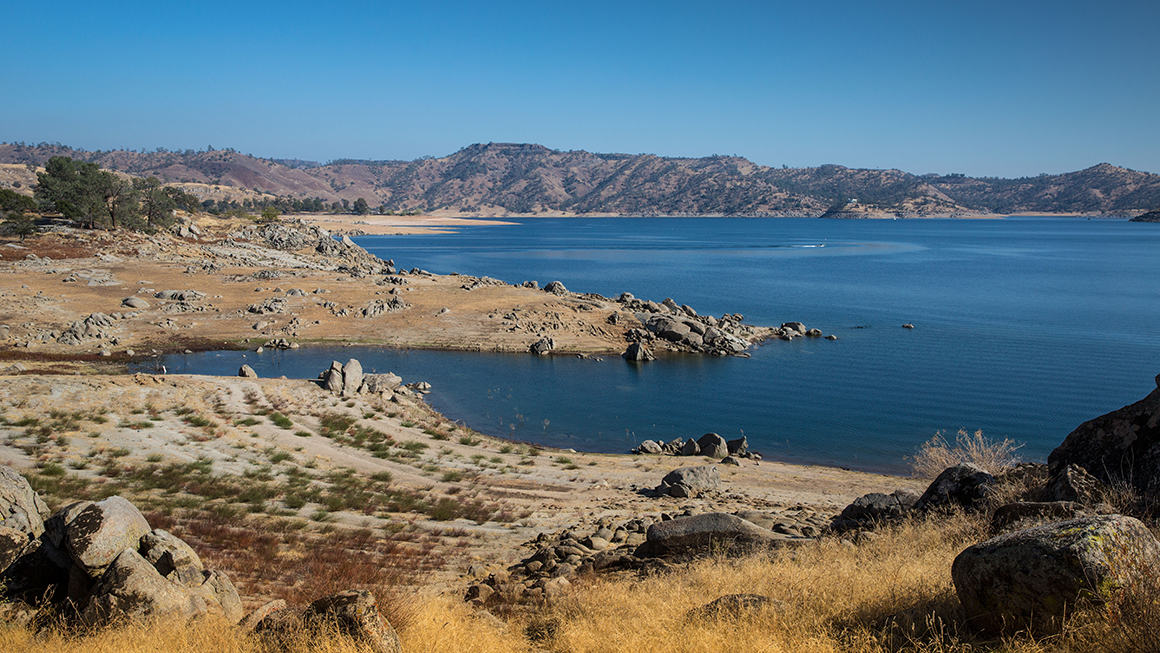
California’s Sierra San Joaquin region produces 40 percent of the nation’s fruits, nuts and other table foods (PDF). These economic activities hinge on reliable, sustainable water resources. But as in many parts of the country, the regional water and wastewater infrastructure is past or approaching its useful lifespan. Infrastructure is expensive to operate and maintain, especially in low-income and rural areas. On top of this, the regions’ water-use rates are unsustainable: of the eight water basins that serve Fresno, Kings, Madera and Tulare Counties, all are critically overdrafted. Meanwhile, water pollution (PDF) is a top environmental concern.
Climate change only exacerbates these challenges. It is expected (PDF) that less precipitation will fall as snow, leading to longer droughts and more water-contaminating wildfires. Rain will come in heavier bouts, like the torrents that led to the reemergence of Tulare Lake in 2023 but did not replenish groundwater. And the precarious, aging water-related infrastructure in the region will be vulnerable to storms that might cause costly breakages and gaps in service.
There’s a lot at stake if these threats aren’t addressed, especially for disadvantaged and unincorporated communities. Without reliable water-related infrastructure, businesses may suffer more disruptions and are less likely to choose to operate in underinvested communities. Aquifer depletion threatens the livelihoods of smallholder farmers across the region. And water pollution can have life-altering impacts including birth defects, poisoning, and cancers, including thyroid cancer.
In 2021, 13 regions in California each were awarded $5 million under the California Jobs First Regional Investment Initiative to plan for climate-forward and equitable economic development. The Sierra San Joaquin region’s Regional Investment Plan draft (PDF), created by the Sierra San Joaquin Jobs Initiative (S2J2), calls for taking a “One Water” watershed management approach to building water-related infrastructure that will be resilient to climate change. One Water refers to the sustainable, integrated management of all water resources, including drinking water, wastewater, stormwater, and groundwater that ensures affordability for all. The S2J2 strategy prioritizes investments in the following:
- safe drinking water (PDF)
- ecosystem restoration
- water supply
- multibenefit land repurposing
- demand reduction
The region’s planned investments in climate-resilient, water-related infrastructure can not only address health issues that people with low incomes, Latinx people, and rural populations disproportionately experience but can also create good jobs for disadvantaged communities. Jobs in the water sector range widely from working in ecosystem restoration or as a civil engineer, to working directly for systems as a water or wastewater operator—a role for which there is a nationwide shortage. The region plans to leverage its existing advocacy, education, training, accelerator, incubator, and networking resources to build skills, support innovation and entrepreneurship, and match workers to water-related jobs with living wages, benefits, and career options.
Decisionmakers in regions across the country who face similar threats to their water resources can look to the multifaceted S2J2 One Water approach. As they weigh priorities, they can apply the following lessons that emerged from a research partnership between the Urban Institute and the S2J2 coalition throughout their plan development process:
- Balance universal approaches with targeted interventions. Accompany broad policies to reduce water use in the region with training, incentives, or technical assistance targeted toward households and businesses that need the most support changing their water-use or related business practices.
- Look for synergies across sectors. Water-related strategies can support nature-based solutions, responsible food and agriculture, and clean energy strategies. Partners and funding for water-related improvements may emerge from new cross-sector partnerships. Building on sector plans and connecting to cross-sector workforce development networks and innovation hubs can support equitable economic transitions.
- Balance climate, equity, health, and economic considerations of water policies and investments. For example, assess the environmental and groundwater-level benefits of fallowing land alongside the economic impacts on those who take land out of production. Accompany policies or mandates with support for those forced to transition to new income-generating activities.
- Balance long-term planning with immediate actions. Invest early in governance, administrative, and community engagement capacities that set the stage for other collaborative actions while addressing immediate failures in infrastructure that threaten public health.
Without solutions like the One Water plan, the environmental, economic, and health consequences of unsustainable water infrastructure could have ripple effects throughout the Sierra San Joaquin region and even the nation. A One Water approach could support economic transitions in water-challenged regions and ensure they’re prepared for all that climate change will continue to bring.
Let’s build a future where everyone, everywhere has the opportunity and power to thrive
Urban is more determined than ever to partner with changemakers to unlock opportunities that give people across the country a fair shot at reaching their fullest potential. Invest in Urban to power this type of work.